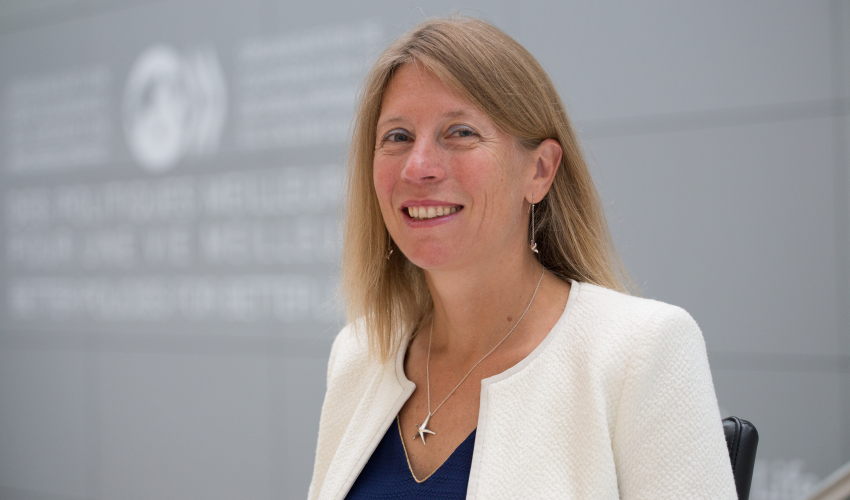
The Worst Shock Since 2008, Take Francesca's Word for It
FRANCESCA COLOMBO, HEAD OF THE OECD HEALTHCARE DIVISION, EXPLAINS WHAT WE CAN EXPECT ABOUT THE SOCIOECONOMIC IMPACT OF COVID19"I am an incurable optimist, I think it will be tough in the short term, there will be severe loss of life and socio-economic repercussions, but in the end we will all come out stronger." That is how Francesca Colombo, who graduated from Bocconi in 1995 and today heads the Healthcare Division of the Organization for Economic Cooperation and Development (OECD), concludes a long distance chat between an apartment in Milan (mine) and one in Paris ( hers). She joined the international organization about twenty years ago as an analyst, after numerous international experiences including leading the Planning Unit of the Guyana Ministry of Health. Francesca is now facing what she does not hesitate to define as "the greatest global health, economic and social shock since the crisis of 2008 ".
How is the OECD moving in this situation?
The OECD is an economic organization committed to helping countries develop better policies for a better life. It works to strengthen multilateralism, in the context of an increasingly interconnected world. For this reason, the whole Organization, not only the Healthcare Division, has mobilized to help countries strengthen their domestic policies in the face of this crisis, as well as to conceive and coordinate common responses between countries. It is a crisis that will have enormous repercussions: in the immediate future, on health, further on the economy and the most vulnerable people in our societies. With my Division we are working on the analysis of the health policies that the various OECD countries are putting in place to counter the emergency, for example regarding the capacity of the health systems. Then we study how to guarantee the service for the whole population, how to use digital solutions to improve surveillance and treatment, and how to improve the research and development prospects of new diagnostics, treatments and vaccines.
What are you noticing about it?
That, after some initial hesitation, there is now convergence on the need for virus containment policies, but also, of course, differences between the capacities of the various health systems, for example as regards personnel, hospital facilities, ability to develop test kits and make them available where the needs are highest. We also observe new innovative initiatives, which seek to use big data and digital technologies to speed up clinical surveillance or artificial intelligence to accelerate the processes of seeking a cure. Of course, it all happened so quickly that it caught everyone unprepared.
Health systems in several countries are already, or are about to be, at risk of collapse.
What makes a system more resistant to these emergencies?
Several factors. Definitely agility in mobilizing resources and having rapid surveillance systems. The OECD has worked extensively with countries to strengthen health information systems and develop the ability to generate and transfer information in real time for surveillance, research and treatment purposes, while respecting privacy. In addition, the health systems that resist best are those that manage to quickly adapt their offer, whether of human resources, hospital, supplies. Emergencies such as the current one are fortunately very rare. Under normal conditions, the health systems of the OECD countries are confronted with the management of chronic diseases that require a strong ability to provide assistance with primary care in their territory. So it is logical that under these conditions no system has a number of beds in intensive care sufficient to withstand the shock of this emergency. The question is therefore how to speed up the response in exceptional situations. This is where the game is decided, and that is why containment policies must be effective to allow the health system time to adapt the response to manage the emergency, especially in the hospitals.
Let's go back to the long-term consequences of Covid: what is your view?
There will be consequences far beyond human lives and health systems, on businesses, on economic growth, on financial markets, on the social fabric, on collective trust. There are major uncertainties, but everyone agrees in foreseeing serious consequences. The OECD has already published several scenarios related to the impact on growth in its Interim Economic Outlook, published on March 2, 2020. According to the worst, world GDP growth would drop from 2.9% in 2019 to 1.5% in 2020, half of what was forecast before the start of the epidemic. After a few weeks, however, it already seems likely that we will go beyond even the most negative scenario.
A rather bleak future. But what will we learn from all this?
We will no doubt think about how to improve pandemic management systems. We will also learn to appreciate the achievements that we have reached in recent years and that we often take for granted. For example, having health systems with universal coverage in almost all OECD countries - capable of dealing with emergency situations overall - or social safety nets and support mechanisms for the most vulnerable, and a third sector, social solidarity, that has rolled up its sleeves in these tough times. But you know, It is precisely on these occasions that the true resilience of a society emerges.
http://www.oecd.org/coronavirus/
http: /www.org.org/health
by Andrea Celauro
Translated by Richard Greenslade
